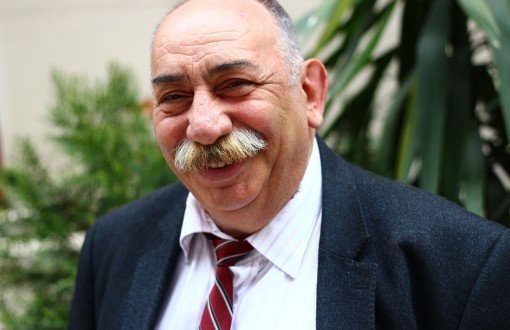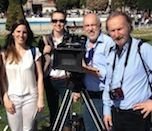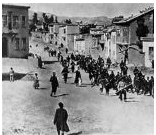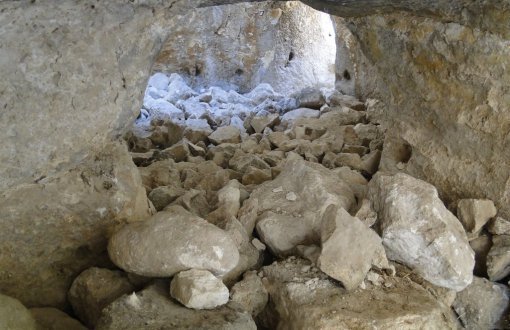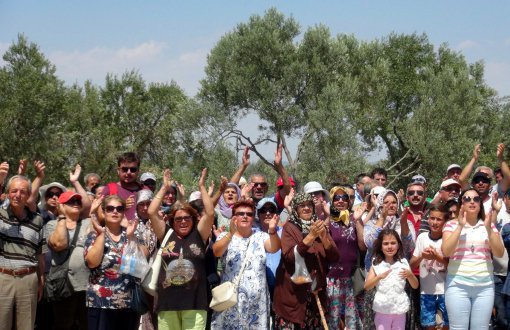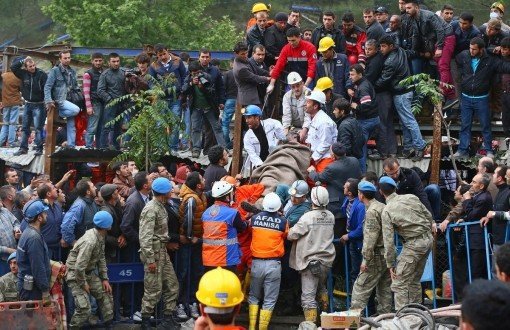His pen name is Pakrat Estukyan even though his identity card says his surname is Estukoğlu. His original name Estukyan became Estukoğlu when surname law forbid using “yan” at the end of Armenian surnames. But he uses Estukyan as his pseudonym to emphasize “how Armenian he is”.
Estukyan was born in 1953 in Rumelihisari, Istanbul. During his childhood years, he lived in Taksim Feridiye Street, a street where Armenians mostly live in. He received his education from Esayan, Mıhitaryan and Getronagan Armenian schools. During his teenager years, him and his friends started Sayat Nova chorus. His passion of music crossed his path with Kardeş Türküler.
He worked as a laboratory technician and wrote articles for Agos newspaper, after Hrant Dink’s murder, and he started to work at Agos’s Armenian-language desk.
He wrote Armenian Hay Stories and was Şişli’s municipal assembly candidate of People’s Democratic Party (HDP).
bianet talked to Estukyan on his genocide survivor grandmothers and grandfathers, his music, his “obligatory” political adventure at HDP and the continuing denial policy before the arrival of 99th anniversary of Armenian genocide.
“No such thing as hometown"
You’re from İstanbul, what about your parents?
Except my parents, all of my family came to İstanbul after 1915. All of these people lost touch with their relatives and their hometowns. Both my parents don’t have any uncles or aunts. From all those crowded families, only one member was left, so they married each other and started up a life in İstanbul.
Where are your grandmothers and grandfathers from?
My father’s father is from Ezbider village of Suşehir, Sivas province. The name of the village is Akıncılar now. My grandfather was working in Ortaköy bakery to earn money during war years. They took him under military service after that. While he was at the war in Şam, Englishmen took him hostage and made him work at a hospital over there. After the treaty, he went back to his hometown, his aim was to go back home, but he had no idea about neither the massacre and nor 1915.
When he arrives in Haydarpaşa, he sees a tent town, lots of people speaking Armenian. My grandfather wants to learn who those people are, what they are doing there. He runs into his brother-in-law there.
“I would like to go back to my hometown” he tells him.
“No, you won’t. You don’t have a hometown anymore. You don’t have a wife or a daughter. They all died.”
So my grandfather stays in İstanbul. He meets his second wife, my grandmother. My grandmother was exiled from Erbaa, Tokat province. She used to tell about 1915 so vividly.
"Women from Niksar saved my grandmother"
How?
She described it like this; “One day, municipal forces arrived. They gathered all of Erbaa’s Armenian men in a parcel covered with prickly wires. My mother sent them food. My brother said they don’t want it, and sent me back. I cried on the way back to our house. That was the last time I saw them.”
They made them walk until the outside of Erbaa and executed all of them. Immediately afterwards, they went back to Armenian houses and told women to take whatever they can, because they were going to be exiled. Then, just like that, women walked away from Erbaa, crying. But, they were only able to go to Niksar.
“Around that time, Topal Osman’s gang came to Niksar, and said: ‘No one’s going anywhere, take all of them to the baths.’ When we heard this, we imagined what’s coming next for us. They were going to burn us in the baths. They stuffed us into the baths. When Niksar women heard about this they immediately came there. They tried to save as much children as they could, but they saved girls mostly. They also saved me, took me to a Muslim family, I stayed there for a while. They made my name Emine.”
She used to describe everything like this.
How long did she stay with the family?
She got sick with typhus, her head went bald. They took really good care of her. After that, an Armenian woman trying to save Armenian girls from Muslim families brought my grandmother to İstanbul and she married my grandfather.
What happened to that family from Niksar?
My grandparents were in touch with them all the time. We never lost touch and I met with their grandchildren.
"My grandfather jumped off the ship"
What about your mother’s family?
My mother’s father is from Erzincan, Kemah. He was a tinsmith but he also went back and forth to Russia as a worker. My mother’s mother is from Şebinkarahisar.
My grandmother was at the orphanage after 1915; they met and got married there. They settled in Trabzon. My grandfather was sent to Çanakkale in 1921 as a soldier and my grandmother gave birth to my mother at that time. After my mother was born, an instruction came to clear Trabzon from all Armenians and Greeks. My mother was in her bundle, she wasn’t even 40 days old yet.
What did they do?
My grandmother comes to İstanbul along with her baby on her lap on the famous ship called Gülcemal. At that time, the church was setting up refugee camps for Armenians who came from Anatolia. Camps were in Samatya, Haydarpaşa and Ortaköy. My mother arrives to the one in Samatya.
My grandfather, released from the military forces, sees that Trabzon is being cleared out, and goes to İstanbul on that ship. But, they don’t let the ship to stop in İstanbul, they say there are lots of Armenians and Greeks in İstanbul now, ships are not going to stop there anymore, and they’re going to Greece directly.
But the ship stops anyways to get coals. When people hear that the ship arrived from Trabzon they run to the port and try to look for their relatives with boats.
My grandmother also goes there but she wasn’t able to find my grandmother and goes back to camp. She sees my grandfather drenched as she arrives to camp. Even though he didn’t know how to swim, he jumped out of the ship to escape from going to Greece. Boatmen took him to the camp. This is the image; a movie would come out of these stories… So, this is how our İstanbul adventure starts.
“We Used to Listen About the Genocide Like a Tale”
How did your parents, second generation of genocide, build a life here? Their memories must have been pretty fresh.
Memories were fresh but to us everything sounded like a tale. Sometimes, my grandparents used to sit and talk about old days. We used to listen to them as if everything was a distant tale; we were never able to understand the seriousness of the situation.
We were aware that it was a major trauma but in those days’ terminology, they didn’t use genocide, they used to call it slaughter and exile. There weren’t any political messages under that. They went through some terrible incidents. That’s how they saw it.
We were lucky because these things were spoken in our houses. In many houses, grandparents never talk about these things to protect their children. As we were growing up, we started to question everything, made them talk about it and never took those things out of our minds ever since.
How did your path cross with Agos?
I’m in Agos since the day it was created. Hrant wanted me to write articles from time to time. After he was murdered, I started to work in the newspaper full time.
What kind of a change did Hrant Dink’s murder create?
It was a very serious change. Because when Hrant was murdered, unlike the courts that weren’t able to give a decision in 7 years, public of Turkey gave their decision in 10 minutes. Everyone knew who murdered Hrant. Public of Turkey saw the big picture, hiding behind Ogün Samast and others. They saw it, and they didn’t like it at all. Over 200 thousand people walked that day. There were a few Armenians in them, including the secret Armenians.
"No Armenians at April 24 Commemoration"
Why were there few Armenians?
While we were listening about the genocide, we knew so well that we can’t talk about it in the street. They didn’t teach us that, we internalized it. No one cared anyways. What are you going to tell who? “My grandfather went through this and that.” It doesn’t matter.
We are afraid and we only have few people, it means nothing. Our fear prevents us to create any kind of awareness. We don’t have the nerves or the bravery to create an awareness, we will just shut up and hush.
There are April 24 anniversaries being done at Taksim Square for four years. About 500-1000 people go there every year. We don’t have that much people. It looks like Armenians are still watching everything behind their curtains.
“I want my gradpa’s name Agop"
What about non-Armenians?
What changed now is: There are many books published on the Armenian issue. Lots of memory books, serious examination books, academicians’ researches. People stop and think about their country from a different point of view.
I’m not talking about Armenians, I’m talking about non-Armenians. They look at the books and see what happened in their hometown before. They would like to know the details. The situation wasn’t like this before. No one asked questions in Turkey before.
And when they started to ask…
People ask their own grandparents. They want them to tell their own stories, what they know about those times. Armenians’ presences in the families are talked about now. They think: “My grandmother is originally an Armenian. Doesn’t she have any sisters or brothers; doesn’t she have any relatives alive?” People go after these things.
Some people say they are Armenian from both sides. They understand that Armenians married each other to reserve their genes. They’re saying my name is Mustafa, why should I be a Mustafa? My grandfather’s name was Agop, so I would like my name to be Agop too. He goes to the patriarchate in Kumkapı, but no one seems sincere, they don’t understand why he came.
Why?
The church is conservative and afraid. If they accept one person, they’re scared more people will come to them. And then, Akit newspaper will put on a headline saying Patriarchate is being missionary and changing Muslims to Christianity. They would be targeted. They’re afraid they can’t deal with all these things.
"Any nation could commit genocide at the right climate”
You said people changed, but what about the official statements?
There is still a denial policy going on, and since it doesn’t have any scientific grounds, Prime Minister Erdoğan expresses it like this: “My ancestors wouldn’t have committed genocide, Muslims don’t commit genocide, Turkish soldiers don’t rape.”
We know that Turkish people commit genocide as well as Germans; Armenians would have too, if they thought it was necessary. We can’t restrict this to nations. This is a crime against humanity and if the appropriate grounds are set, any nation could be a part of it. All societies have this potential.
In Turkey, the appropriate grounds were set in the year of 1915. One of my friends told me: “I have such grandfathers, they cut 6 Armenians and looking for the 7th one to go to heaven.” They were able to inject these ideas to people. For example, people in Syria are ready to cut Alewites and Christians.
Which effects of the genocide is still painful for Armenians?
The most obvious pain for Armenians is denial. In a way, denial means pursuing the genocide. There is also a deeper pain, loss of homeland. In the history of Armenians, you can see countless number of tyrannies like this. Armenia had been invaded by various powerful countries before, and every time, there were many massive slaughters and exiles. But Armenians had never lost their homeland before.
2015 is coming up… What do you think about it?
2015 is a date only, we are going to live it, and it is going to pass. It’s not a magical wand. What’s important is to create a change in people’s minds in Turkey. They need to reconsider their perception.
If we learn how to do empathy, Turkey will be a more livable country, and we will be in peace with the world. (NV/ENÜ/BM)
* Click here to read the article in Turkish.





